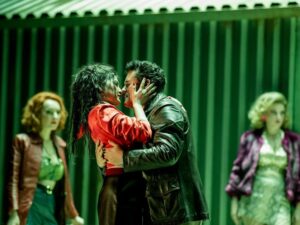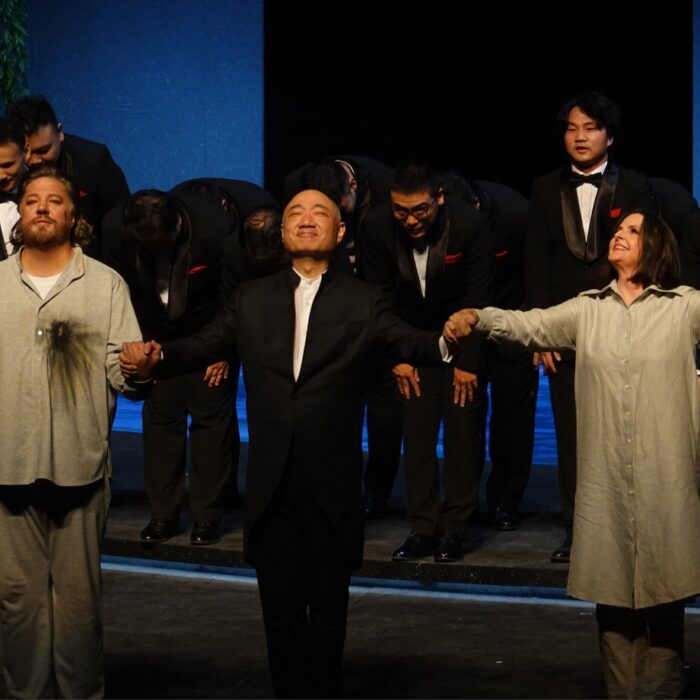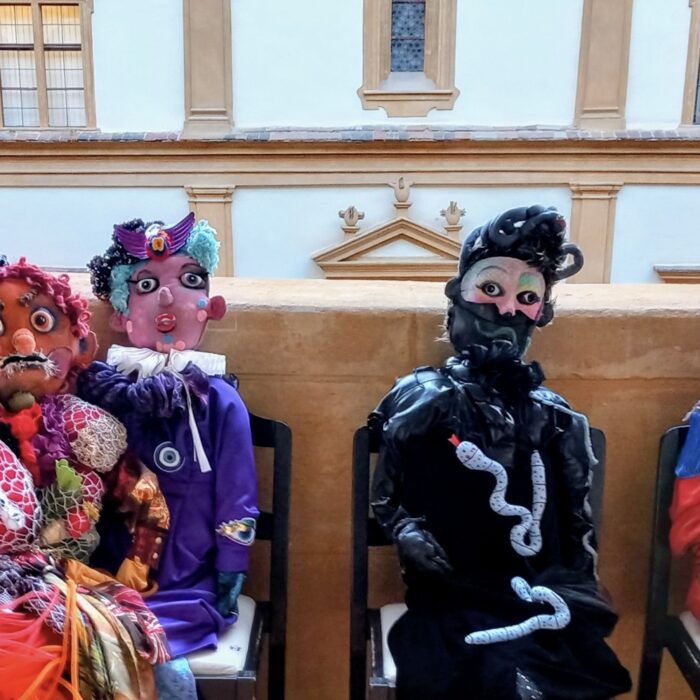
Royal Opera House 2023-24 Review: Carmen
Aigul Akhmetshina & Piotr Beczala Shine in Disappointing Michieletto Production
By Mike Hardy(Credit: Camilla Greenwell)
At the very opening of Damiano Michieletto’s new production of “Carmen,” I was struck by a very vivid sense of déjà vu! Before the curtain rises, a very sombre, spectral lady enters the stage, dressed in black with lace mantilla. For a brief instant, I thought I was back, four days PREVIOUSLY in the same house, where I reviewed “Lucia di Lammermoor,” a production that was proliferated with phantoms wandering, menacingly, on to the stage at regular intervals.
And, as in THAT opera, the lady in question here, (presumed to be some depiction of Don José ‘s mother), was equally the symbolic prophecy of doom. Perhaps it’s the current trend at Covent Garden to have silent harbingers of ruination.
There are no jolly Gypsy wilderness settlements here; no romantic, breathtaking mountain backdrop trysts, no cigar rolling on maidens’ thighs. Whilst I’m an advocate of updating old productions, even to a more contemporary setting, (here we’re somewhere around the 1970’s), staging and direction wise this performance fails on many levels. From the opening scenes, where the townsfolk appear too many, too conjoined and too engaged in overly contrived occupations with over elaborate hand-gestures and physical demeanours; to the final scenes where Carmen meets her demise, devoid of any witnesses, their appears to be anomalies with almost every one of Paulo Fantin’s set designs.
The second Act, which the program describes as being located in a nightclub, is very clearly a true den of iniquity, if not an actual brothel. Certainly, the lighting, fittings and stage directions reinforce and compel that impression. Actually, there is the rub. The settings themselves are viable, just the interactions of the performers within them which seems to augment the irregularities.
In the first act for example, the children’s chorus gather in the Town square, in succession. A wanderer here, a cyclist there, another little huddle, then more bicycles which all then adopt their carefully allotted positions before commencing their performance, requiring them to take up an obvious static, preparatory pose, spread across the entire stage. This exuded a tinge of ominousness, almost reminiscent of a scene from Stephen King’s “Children of the Corn.” This illusion was compounded when they proceeded to bully the younger children, who fled screaming. Fortunately, their singing was quite exquisite, which, as is so often the case, (and for which I find myself frequently repeating), was the saving grace for the whole show.
The ensemble of women whose affray antics lead to the eventual arrest of Carmen was comedic, their fight scenes completely without credibility and poorly choreographed. Vocally however, they too, as with all the opera house chorus, were quite wonderful.
Ideal Interpreters
Russian Mezzo-Soprano Aigul Akhmetshina is almost universally acclaimed as the Carmen of our times, a role for which she is constantly developing, and one which has attracted the attention of every opera house in the world in their clamour to sign her. At 27, inarguably beautiful and with natural charisma and stage presence, as Carmen she exudes self-assurance and fortitude in equal measure. Moreover, she possesses a fabulous instrument, a rich, creamy, velvety mezzo with a wonderful timbre and wide-ranging palette. She has a beautiful, dusky lower register yet produces thrilling, clarion top notes. Consequently, her “Habanera” and “Seguidilla” were glorious, flamboyant, effortless, and well received. Her “En vain pour éviter,” however, was her true triumph, where she was at her most stirring and emotive.
A consummate actress, she portrays all the qualities of the ideal Carmen; feisty, independent, mesmerizing, beguiling, yet retaining convincing vulnerability. But…she has a big job to do here, her given stage directions doing little in the way of contributing to the authenticity of her dalliances with either Don José OR Escamillo.
In the former, there was no establishing connection between the two, no tangible or visible interrelation. No romance, no flirtatious enactments, NOTHING in either Carmen’s or Don José’s script here to suggest any blossoming romance. Merely a promise of illicitness in exchange for her freedom in the police station scene. Again, this is not as a result of any acting deficiency, just purely eccentric stage directing.
Acclaimed Polish tenor Piotr Beczała takes the role of Carmen’s jealous, murderous lover, Don José. A tenor still at the very top of his game, he sings with authority and assuredness. He has an evocative chest voice and an accomplished top with ping and beauty of tone. His big aria, “La fleur que tu m’avais jetée” was solid and impassioned and his final scenes were utterly convincing where his emotion and turmoil were allowed to be displayed. His “Eh bien, damnée!” uttered when approaching Carmen to kill her was intense. Again, Beczala has already established credentials as a fine actor, but his direction here renders him a contemplative, introspective lover whose imperious voice did all the characterization. In his scene with his ardent admirer, Micaëla, the famous letter duet, he is clearly most disinterested in the girl, never holding her gaze for a moment and striding purposely around the stage, wrangling with his own personal emotions. I considered this to be a bizarre interpretation of this scene as it is a most pivotal, fundamental contribution to the whole tale: Micaëla’s wholesome infatuation with Don José contrasting with Carmen’s, seemingly superficial and salacious flirtations with him. More noticeable was the fact that, despite delivering Don José’s letter to him from his mother, with the promise: “Un baiser pour son fils! José, je vous le rends, comme je l’ai promis.” (A kiss for her son! José, I give it to you as I promised), Micaëla never DOES give him the kiss, a bizarre omission and curious omission from Bizet’s tale.
Not Quite There
The role of Escamillo is, almost by definition, the epitome of Alpha male; confident, forceful, a toreador of supreme charm and confidence, and usually large of voice. Alas, Lithuanian bass-baritone Kostas Smoriginas doesn’t quite fulfill any of those capacities. Dressed in a weird, gaudy mustard green tinged suit, he came across more as a shady, dandy hustler than a bull fighter. His dress and demeanor totally undermined his entry, usually a grand affair in this opera. Worse, he initially struggled to project with his famous Toreador’s song producing a somewhat underwhelming rendition. He DID, however, manage to emit a more pronounced and convincing sound in his confrontations with Don José. A former Jette Parker member, his voice is unquestionably fine, just seemingly underpowered on this occasion. Additionally, he didn’t really convince as a man of steel, engaging in an odd ruckus with Don Jose which sees him torment his rival a la toreador, using his jacket as a bullfighter’s cape, a clever idea but in theory. The ensuing brawl over dramatic and contrived, so as to be almost comedic.
Likewise, despite otherwise very favorable reviews elsewhere of Ukrainian soprano Olga Kulchynska in the role of Micaëla, on this occasion I found her wanting, vocally, especially in her interactions with Don José. I am inclined to feel she may have been under the weather on this occasion as she clearly possesses a fine soprano instrument, which did manage to produce with some evocative moments and resonant head notes in her smuggler’s hut aria, “Je dis, que rien ne m’épouvante.” I also found her diffidence and comedic timidness and insecurity touching, especially in the mother’s letter scene.
Kudos must also go to the other performers, as well as the Jette Parker Artists Programme for their nurturing of such fine talents. Blaise Malaba, as a formidable Zuniga with a splendid, sonorous tone. I would love to hear HIM tackle the role of Escamillo.
French tenor Vincent Ordonneau had a ball as Remendado, enthusiastically getting to grips as one of the smugglers and having a bright, dominant tenor voice. He is surely destined for bigger roles.
Impressive Turns
Speaking of people destined for bigger roles; I have been repeatedly impressed with Canadian soprano Sarah Dufresne. I first reviewed her very brief performance as a very aptly named ‘‘Voice from heaven’, in “Don Carlo” and she appears here as Frasquita, heavenly voice tangibly intact. She conducts herself with great physical confidence and is endowed with a beautiful, lyric soprano voice of some quality. Lithuanian mezzo-soprano Gabrielė Kupšytė gets to play her bestie, Mercédès, who also sparkles and radiates joie de vivre.
As already stated, the chorus were magnificent and beautifully harmonious. The children’s chorus, likewise, producing splendid music, although they were rather also bizarrely employed in the entr’actes, where they got to parade in front of the closed curtain and announce the passages of time via cardboard panels spelling out the French proclamations, including “One Month Later,” etc. Very cute and frivolous, first-time round. After several repetitions, however, particularly when one of the kids gets to ham it up, (getting left on the stage after the others have exited before feigning surprise and running off to join them), it not only loses its appeal, but the untimely slapstick interjection sits a tad uncomfortably with the gravity of the impending dark conclusion to the opera.
The orchestra were proficient enough, although I don’t think I’ve seen a more laid-back conductor than Antonello Manacorda who resorted to conducting, at times, with the tiniest of hand gestures, as though he was happy to let the orchestra get on with it. This translated into a slight lack of cohesion at times, I felt, although the individual instrumental solos were sublime.
I feel that having attained such great success and acclaim with his revolving sets in “Cavalleria Rusticana/Pagliacci” at the end of last year on the same stage, Michieletto concluded that employing the same technique would enhance his production here. It did not. Whereas, in that award-winning staging, the sets turned to reveal evocative and salient sub-plots and conjoined incidents, creating atmospheric expectation, here they turn to reveal only anti-climaxes. The repetition here is far too redolent of his previous efforts and consequently far too easy to make comparisons and to accentuate its inferiority to the original.
Special mention MUST, however, go to lighting designer Allesandro Carletti, who created some quite splendid effects with glorious color, spots, and fills, without which these sets would have been infinitely drabber.



